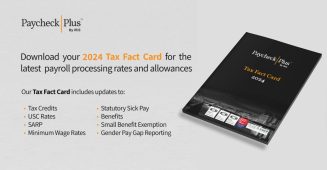
Banded Hours
Banded Hours – Requirements for Employers and Payroll Professionals
The Employment (Miscellaneous Provisions) Bill 2018 became law on 4th March 2019. The Act impacts on all employers – one of the provisions is a requirement to issue core terms within FIVE days of an employee starting work. Continue reading to find out what Banded Hours are, how to find the correct band, how to change between bands, when an employer can refuse to change an employee’s band and the requirements for employers and payroll professionals.
What is “Banded Hours”
Banded Hours is a provision in the Employment (Miscellaneous Provisions) Bill 2018. This act sets out the rights for employees whose employment contract does not accurately reflect the reality of the hours they work on a consistent basis. Employees on a low-hour contract of employment and regularly work more hours than what their contract says, can ask their employer to change the contract terms to better reflect the number of hours worked over a 12-month period
The band that the employee falls under will be ascertained by averaging the weekly working hours for a period not less than 12 months.
Employees in a band are essentially guaranteed the minimum number of hours in that band.
What Are the Banded Hours?
There are eight different bands laid down in law as set out in the below table.
| Band A: | 3 to 6 hours |
| Band B: | 6 to 11 hours |
| Band C: | 11 to 16 hours |
| Band D: | 16 to 21 hours |
| Band E: | 21 to 26 hours |
| Band F: | 26 to 31 hours |
| Band G: | 31 to 36 hours |
| Band H: | over 36 hours |
How Can Employees Change Between Bands?
If an employee believes that they are in an incorrect band a request must be made to the employer in writing. If employees are unhappy with their band and the employer refuses to change their band a claim can be lodged with the Workplace Relations Commission (WRC) in accordance with Part 4 of the Workplace Relations Act 2015. The employer or employee can appeal a decision to the Labour Court in accordance with the Workplace Relations Act 2015 (Section 44).
When Can An Employer Refuse A Banded Hour Adjustment Request?
According to the Employment (Miscellaneous Provisions) Bill 2018, an employer may refuse to place an employee on the band requested in any of the below circumstances:
- Where there is no evidence to support the claim in relation to the hours worked in the reference period.
- Where there has been significant adverse changes to the business, profession or occupation carried on by the employer during or after the reference period.
- Due to exceptional circumstances, an emergency or unforeseeable circumstances beyond the employer’s control.
- Where the average of the hours worked by the employee during the reference period were affected by a temporary situation that no longer exists.
Requirements for Employers and Payroll Professionals
Below we have identified 8 key new duties that employers, and specifically payroll professionals, would/could be responsible for if the bill passes in its current state:
Below we have identified duties that employers, and specifically payroll professionals, are responsible for:
- Determine the correct band for appropriate employees – to do this, find their average weekly working hours during the 12 month period prior to the request from the employee and place them in the corresponding band (see table above)
- Ensure each employee works at least their minimum working hours or compensate appropriately
- Determine if a Banded Hour request change should be approved or denied
- Place the employee, if appropriate, in the correct band within 2 months of their request
- Put a case together for the denial of a Banded Hour request change
- Manage band request communications and potential conflicts, including WRC inspections if necessary
- Ensure all Banded Hours employer obligations are met, for more details visit the Banded Hours section in the Employment (Miscellaneous Provisions) Bill 2018
- Develop and implement Banded Hours contracts.
Legislation Compliance – Focus on Profits
Here at Paycheck Plus we understand that ensuring compliance with the most up-to-date legislation changes is a difficult and time consuming task for most businesses – as Ireland’s premier payroll service we know that you would rather focus on profits over legislation changes and paperwork, this is why we provide complete and comprehensive services. As well as fully managed payroll outsourcing, we provide an extensive range of Irish payroll services including consultancy, payroll audits, reporting, training, payroll set-up and wind-down, and special projects. We stay of the forefront of legislation developments so you don’t have to.
For more on Banded Hours and other payroll issues read:
Paycheck Plus, Your Outsourced Payroll Provider
As the most decorated payroll bureau in Ireland, we provide comprehensive, ISO accredited payroll outsourcing services to organisations of all sizes. Our award-winning team of payroll experts specialise in all aspects of payroll, including those not offered by other Irish payroll companies. Our outsourced payroll services include payroll consultancy, payroll audits, payroll reporting, payroll training, company registration and redundancy management.
To ensure payroll accuracy or for more information on our Irish payroll services simply request a payroll quote or call our Irish office on +353 (0) 1 905 9400.



